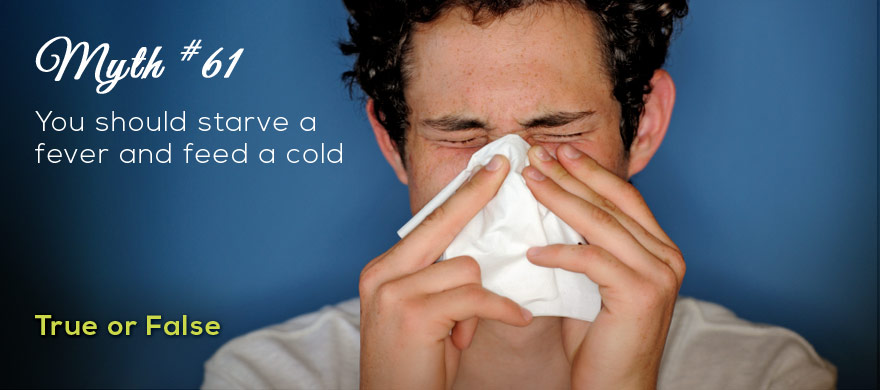
False.
Most people, including me, get sick one or two times a year. When I’m sick I often try to remember how to appropriately treat whatever is ailing me (cold, fever, etc.) by following the common saying “you should starve a fever and feed a cold”. However, when I’m in the middle of fighting an illness, I usually can’t remember if I should be “starving” a cold or a fever, and which one it is that I should be “feeding”. It can get to be downright confusing. What if you accidently “feed” or “starve” the wrong condition, will that make it worse? This idea of starving a fever and feeding a cold may be a result of the belief that colds were due to decreases in body temperature, so eating more would add calories to the body and increase temperature. On the other hand, withholding calories when you had a fever would help decrease body temperature. Also, many times when people have fevers they don’t have much of an appetite, some believe this is our body’s way of telling us to not consume calories.
Many people still recommend starving fevers and feeding colds (just spend a few minutes scanning the internet), but most reputable healthcare professions do not. The advice often heard from doctors and nurses to people who are sick include: staying hydrated, resting, and eating some healthy food if you have an appetite. There is research (Bazar et al., 2005) that suggests eating may positively impact some immune system functions in the body. But again, most healthcare professionals wouldn’t recommend someone forcing themselves to eat if they are feeling nauseated or they have no appetite. The bottom line is, if you are sick you should rest, drinks fluids, and eat some healthy foods as tolerated.
Reference:
Bazar K, Yun A, Lee P: “Starve a fever and feed a cold”: feeding and anorexia may be adaptive behavioral modulators of autonomic and T helper balance. Medical Hypotheses (2005), Vol 64, pps. 1080-1084.
